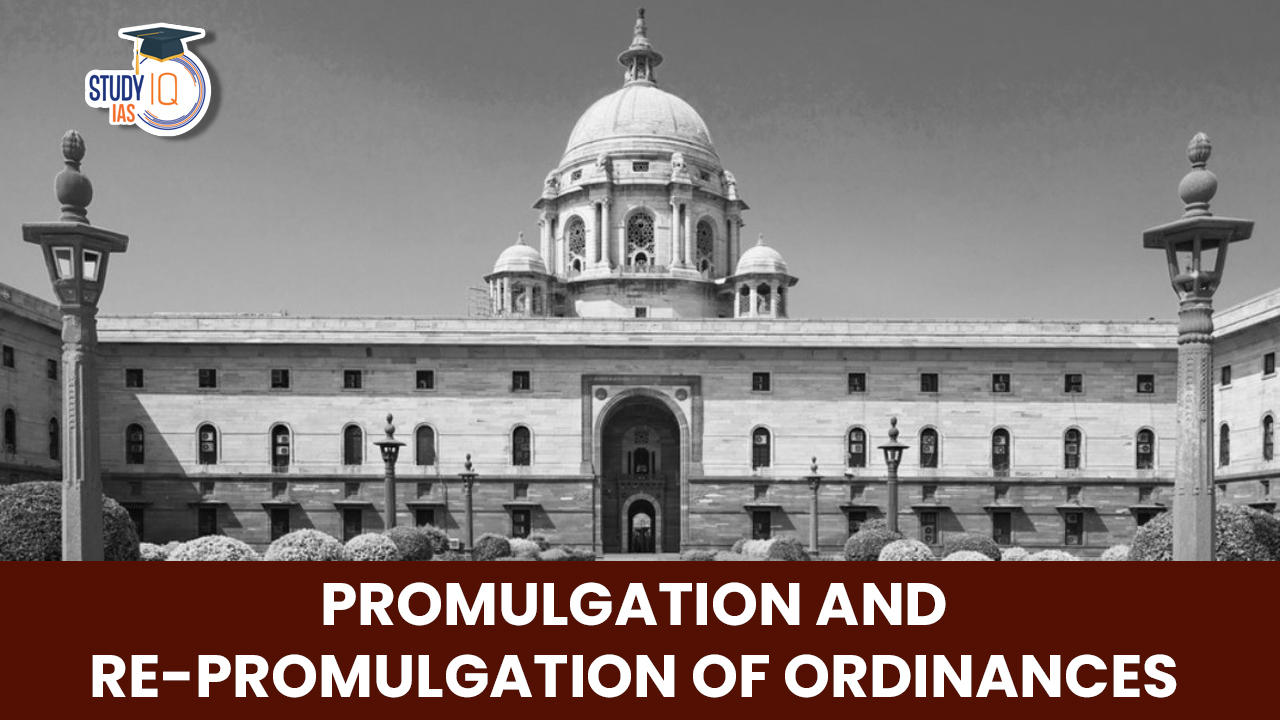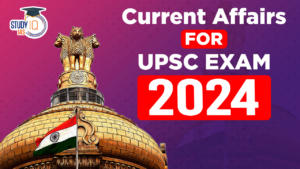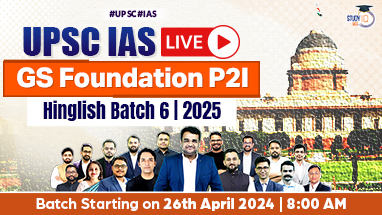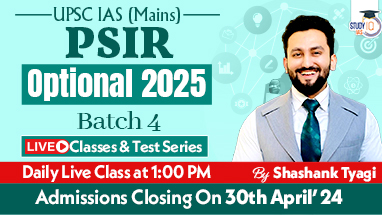Table of Contents
Context: Recently, the Central government promulgated an ordinance to nullify the Supreme Court’s recent verdict on the Delhi government’s powers over administrative services in the national capital.
What is an Ordinance?
- An ordinance is an executive order issued by the President of India or governor of a state, that holds the same force and effect as an Act passed by the Parliament.
- This step is taken when both or either of the houses is not in session due to break and there is an urgent requirement of a law to be passed on an important issue concerning public interest.
- The constitutional provision of ordinance promulgation has been taken from the Govt. of India Act 1935.
Promulgation of ordinances by the President of India
- Article 123 deals with the ordinance making power of the President. The President has many legislative powers, and this power is one of them.
- He can only promulgate the ordinance under these circumstances:
- When both the houses or either of the house is not in session
- Circumstances occur where the President thinks it necessary to act without waiting for houses to assemble.
- Properties of an ordinance:
- For an ordinance to exist, it should be approved by the Parliament within six weeks of it being introduced.
- The maximum duration of an ordinance issued by the president of India can be 6 months and 6 weeks (In case of non-approval by the Parliament).
- An ordinance can be retrospective in nature.
- The power of ordinance making is not to be taken as a substitute for the legislative power. Only under special circumstances, ordinances can be rolled out.
- Ordinances cannot be used to revoke the fundamental rights of the citizens guaranteed by the Indian Constitution.
- The ordinance would also be declared null and void if both houses passed a resolution opposing it.
Supreme Court’s judgement on ordinance making power
- RC Cooper Case 1970: Supreme Court in RC Cooper vs. Union of India (1970) held that the President’s decision to promulgate ordinance could be challenged on the grounds that ‘immediate action’ was not required, and the ordinance had been issued primarily to bypass debate and discussion in the legislature.
- DC Wadhwa Case 1987: The issue of frequent promulgation of ordinances was again brought up in the Supreme Court through a writ petition.
- The petition was regarding the promulgation of 256 ordinances between 1967 and 1981 in Bihar.
- This included 11 ordinances that were kept alive for more than 10 years and famously dubbed as ordinance raj.
- The Supreme court held that the legislative power of the executive to promulgate ordinances is to be used in exceptional circumstances and not as a substitute for the law-making power of the legislature.
- Krishna Kumar Singh V/S the State of Bihar, 2017: Supreme Court held that the authority to issue ordinances is not an absolute entrustment but is “conditional upon satisfaction that circumstances exist rendering it necessary to take immediate action”.
Repromulgation of Ordinances
- The Constitution of India in Article 123 and Article 213 are silent on repromulgation which could have two implications, first that the silence is permissive and second that the silence is prohibitive.
- An example of repromulgation of ordinances is the ‘Land Acquisition Ordinance’ passed by the BJP government in 2014. Even though it lapsed after the six-week period in the Parliament and ceased to exist, it was repromulgated, and then repromulgated again nearly 3 times until it was passed.
- The Government was aware that they lacked support in the Upper House for it to pass there, and hence kept repromulgating the ordinance multiple times as the Constitution is silent on it, hence misusing their power.
- In Krishna Kumar Singh V/S the State of Bihar, 2017, the Supreme Court held that re-promulgation of ordinances is a “fraud” on the Constitution and a subversion of democratic legislative processes, especially when the government persistently avoids placing the ordinances before the legislature.
- The court clarified that there might be circumstances permitting the re-promulgation of an Ordinance — however, it said, repeated re-promulgations without bringing the Ordinance to the legislature would usurp the legislature’s function, and will be unconstitutional.
Promulgation of ordinance by the Governor of a state
- Article 213 of the Indian Constitution empowers the Governor of the State to promulgate ordinances when the State Legislative Assembly is not in session.
- Governor’s power of ordinance making is quite similar to the President’s power. The comparisons between this two w.r.t. Ordinance making is given below:
| Ordinance Making Power of President | Ordinance Making Power of Governor |
| He can promulgate ordinance when either Lok Sabha or Rajya Sabha is not in session or if both are not in session. | He can promulgate ordinance when the Legislative Assembly is not in session in case of the unicameral legislature or when both Legislative assembly and council are not in session in case of a bicameral legislature |
| He can roll-out an ordinance for only those matters on which Parliament (Lok Sabha & Rajya Sabha) can make laws | He can roll-out an ordinance for only those matters on which state legislature can make laws |
| His ordinances have the same effect on policies as parliament’s acts will have. | His ordinances have the same effect on policies as state’s acts will have. If his ordinance legislates on matters which state government has no power on, the ordinance stands null and void. |
| The ordinance introduced by him can be withdrawn anytime. | The ordinance introduced by him can be withdrawn anytime. |
| His power to promulgate ordinance is not a discretionary power. Council of Ministers’ (headed by PM) advice is a pre-requisite. | His power to promulgate ordinance is not a discretionary power. Council of Ministers’ (headed by CM) advice is a pre-requisite. |
| No instructions are needed by President’s when he promulgates an ordinance. | President’s instructions on the following three cases are must:
|
What are the issues associated with the ordinance route of legislation?
- Usurpation of Legislative Power: The ordinance route allows the executive to bypass the legislature and make laws in urgent situations, but it undermines the legislative power by extending the life of an ordinance through repromulgation, effectively circumventing the requirement for parliamentary approval.
- Undermining the Doctrine of Separation of Powers: Repromulgation of ordinances without specific numeric limits undermines the principle of separation of powers by allowing the executive to make permanent legislation without adequate legislative scrutiny or input.
- Shortcomings in Legislative Scrutiny: Ordinances are subject to less rigorous legislative scrutiny compared to bills passed through the regular parliamentary process. This can lead to potential shortcomings in terms of thorough examination, amendment, and stakeholder consultation.
- Lack of Parliamentary Debate: Ordinances are often promulgated without extensive debate or input, as they are issued by the executive without the comprehensive legislative deliberation that takes place in parliament.
- Ignoring Supreme Court’s Judgements: Despite the Supreme Court’s judgments on the use of ordinances, both the central and state governments have often ignored the court’s observations and continued to repromulgate ordinances repeatedly, disregarding the need for legislative deliberation and approval.


 Current Affairs 29th April 2024 for UPSC...
Current Affairs 29th April 2024 for UPSC...
 Towards Green Growth, Impact of Climate ...
Towards Green Growth, Impact of Climate ...
 Editorial of the day (29th Apr): Israel ...
Editorial of the day (29th Apr): Israel ...

















